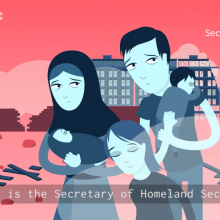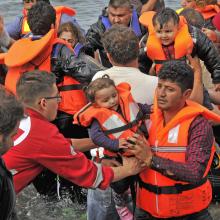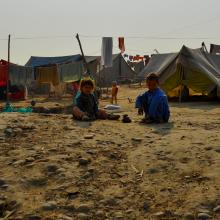Refugees

Image via YouTube / ATTN:
“Taking in refugees at a time of crisis is simply the right thing to do.”
These words from Jeh Johnson, the United States Secretary of Homeland Security, are spoken in a recent video released by the new-media news source ATTN: on Nov. 24. Through simple, yet powerful, illustrations, the video debunks the myths of refugee resettlement in the United States, with specific attention to the Syrian refugee crisis.
The GOP leadership really doesn’t want refugees to come to the United States. And Stephen Colbert has a few things to say about that.
Republican leaders in Congress approved a bill Nov. 19 requiring “our nation’s top security officials” to certify that each refugee poses no threat, despite the United States’ already stringent immigration guidelines. Under the guise of “security,” the bill practically functions to severely restrict the number of Syrian refugees able to enter the United States.
All of us are understandably sad about Paris — devastated. Many people have used striped profile pictures, candles, and flowers to express our collective solidarity. But in the wake of tragedy, almost half of the governors of the U.S. have responded with fear, announcing that they will do whatever they can to thwart the acceptance of Syrian refugees — from cutting funding for nonprofit resettlement agencies, to demanding religious screening tests.
If there’s one thing I learned from some of my friends who are refugees, it’s how to respond to grief. And there’s no one approach and they didn’t always get it right. But sometimes they did: Some refugees, in the shadow of shocking sadness, sang more than usual, prayed louder, invited more friends over for dinner, cooked their parent’s recipes. None of them responded with terrorism.

Image via punghi / Shutterstock.com
French president François Hollande announced on Nov. 18 that France will continue to resettle refugees.
Over the next two years, Hollande said that France would welcome 30,000 refugees from Syria and Afghanistan, among others. This is even more than his September commitment of 24,000.

Image via ekvidi/Shutterstock.com
Christian groups are strongly condemning the anti-refugee rhetoric coming from top GOP leadership this week, reports POLITICO.
In the wake of the Paris attacks, many in the U.S. media speculated that one or more of the attackers had entered France as refugees from Syria, prompting state senators, governors, and even U.S. presidential candidates for the GOP to vow to close U.S. borders to Syrian refugees altogether.
These statements are being decried by Christians nationwide, including those with more historically conservative positions on immigration and foreign policy.

Syrian refugees arrive in Lesvos, Greece in October. Anjo Kan / Shutterstock.com
Whether you like it or not, Christians are called to help the world’s most abused, hurt, helpless, exploited, and destitute.
If you’re a follower of Christ passionate about social justice, of if you attend a church that claims to be enthusiastic about global missions, or if you’re part of a Christian organization that facilitates ministry, you’ve been handed a golden opportunity — the ability to minister to millions of people in desperate need.
This is a chance to be radically countercultural — to glorify Christ through selfless sacrifice, hospitality, and love. Being a Christ-follower isn’t easy, and it will require hard work, but it’s worth it.

Image via Alejandro Ernest / EFE / REUTERS / RNS
Pope Francis has decided to donate a crucifix given to him by Cuba’s president, Raul Castro, to a parish at the forefront of the European refugee crisis.
Francis will give the crucifix to parishioners on Italy’s southernmost island of Lampedusa, where thousands of refugees and migrants have arrived in recent months.
Standing more than 9 feet tall, the crucifix is made of wooden oars, as a symbol of migration. Crafted by the Cuban artist Kcho, it was given to Francis by Castro during the pontiff’s official visit to Cuba in September.

Image via crazymedia007/Shutterstock
The pope’s teachings and his deeds have inspired people to put aside their differences and to work together for a common good. We hope that this momentum will carry over to the debates on immigration. We must work together push back against the hateful anti-immigrant messaging coming from some of our elected officials and candidates for office, and draw on the moral high ground we find in our faith and Scriptures. Including Matthew 25.
Beyond the need for broad-based legislative reform, ordinary people and communities of faith in the United States can also make a difference on an individual and family level. Just as the pope has called on European Catholic churches to “welcome the stranger” in their own parishes and homes, American churches, synagogues, mosques, and even individual homes should take up that challenge as well. It’s time for people in the United States and Europe to learn what it really means to welcome the stranger.

Image via homas koch/Shutterstock
When one of the U.K.’s most beloved religious programs took the opportunity to profile a group of Ethiopian and Eritrean Christians and document the church they built within the “jungle” of Calais, you can imagine the resulting shock.
Some sources, such as the U.K.’s Daily Express, labeled the profile a propaganda piece, called for punitive measures against the BBC, and claimed the BBC was a politically biased institution out of touch with the concerns of the common tax payer.
But what the story revealed was this: that at the borders of one of the largest and most influential national churches in the world, this flimsy construction of tarps and plywood reflected the endurance of faith, the tenacity of hope, and the beauty of grace with more elegance and majesty than Europe’s empty cathedrals.

Image via dinsor/Shutterstock
Three weeks ago, on Aug. 7, the American public had ample summer entertainment choices for killing time. There was the release of the latest Marvel film, Fantastic Four, which despite its fantastic failure with critics still had a $26.2 million opening. There was also the first GOP presidential primary “debate,” which guest starred The Donald and drew 24 million viewers, making it the highest-rated primary debate in television history.
Meanwhile, in the Middle East, radicals weren’t killing time at all, but making further advances. That same day, ISIS attacked Qariyatain, a strategically located town in the Syrian province of Homs. The attack is said to have resulted in at least 230 kidnappings.
August 7 was already a day of infamy in the Christian history of the region. It was already known as “The Day of the Martyrs” within the Assyrian Christian community. On that day in 1933, as many as 3,000 Assyrian Christians were massacred in Simele (northern Iraq). It's also the day ISIS captured Qaraqosh — the “Christian capital” of Iraq — forcing Christians to flee the Nineveh Plain to Kurdistan, eliminating 1,900 years of Christian presence in Nineveh.
Many American Christians say they are hungry for leadership, but what are we actually doing beyond indulging in fictional stories of Mr. Fantastic, Invisible Woman, Human Torch, and The Thing battling evil, or the barely less fictional “leadership” on display in contemporary politics?

Brain illustration, Maxim Gaigul / Shutterstock.com
National Minority Mental Health Awareness month is upon us in the U.S., and never has the scope and impact of mental health issues threatened to affect the long-term security of our country and world than now.
This year, the UN Office for the Coordination of Humanitarian Affairs estimates that 10.8 million people are affected by the conflict in Syria, with 4 million refugees having fled the country. This is the largest refugee population coming out of any one conflict in over a generation. Similarly, in early 2015, UNHCR estimated that the total population of concern, due to the conflict in Iraq, exceeded 3 million people. Millions of people have experienced the unimaginable trauma of political and religious conflict and persecution in the Middle East, especially women, whom the Iraqi Ministry of Health determined were disproportionately affected by mental health illness due to the recent conflict. The scale and depth of the trauma demands a multi-faith, multi-sector, multi-discipline response, before it is too late.

Security fence, Maren Winter / Shutterstock.com
The families arrive at the center after having traveled for weeks. Their bodies are completely filthy dirty. Their clothing and shoes have a darkened, grey, muddy appearance. In some cases, their clothing is still wet from having crossed the Rio Grande River. Since June of last year, large groups of refugees, mostly mothers with a child or two, walk through the door of the Humanitarian Respite Center at Sacred Heart Church in McAllen, Texas, their faces full of joyful tears as they experience the warm and welcoming faces of the many volunteers applauding, shouting out, “Bienvenidos!” “Welcome!”
The refugee families just spent several days at the Border Patrol Processing Station – the “Hielera” – the “Ice Box” as the refugees call it, because it is freezing there. While in this processing facility, the refugees are kept in cells, where they wait fearfully for what is to become of them.

An Assyrian woman attends a Mass on March 1, 2015, inside Ibrahim al-Khalil church in Jaramana, eastern Damascus, in solidarity with the Assyrians abducted by Islamic State fighters in Syria. Photo via REUTERS / Omar Sanadiki / RNS
It would be nice to consider emigration as a realistic option. But it is not. I would suggest pundits spend that same time and money fighting for a clear and concrete objective, declaring and defending a safe haven on the Nineveh Plain for Christians, Muslims, and Yazidis.
Yes, there are some high-risk situations that demand emigration. But, in general, Western Christians should think hard about how not to be an accomplice to ISIS.
Central America needs help expanding education opportunities, building child welfare systems, and sheltering victims of violence and witnesses to crime. But none of these reforms can be sustained unless Central American governments also work to eradicate corruption and reform their judicial systems.
As Romero said during a time of similar urgency, “On this point there is no possible neutrality. We either serve the life of Salvadorans or we are accomplices in their death. … We either believe in a God of life or we serve the idols of death.”
Sitting outside the central train station here in eastern Sicily, a 16-year-old who would only give his name as “Simon” hunched his knees up to his chest and wrapped himself up into a ball. With little spoken English, the teenager from Eritrea has taken to miming the way he traveled across the Mediterranean.
He was one of around 325 migrants crammed into an overcrowded boat that left Libya earlier this month, only to lose power a few hours into the journey.
“I DON’T BLAME the Border Patrol. I blame our country,” Sister Norma Pimentel told Rep. Jim McGovern on a hot afternoon in McAllen, Texas, last August.
“It’s like a burning building,” explained Pimentel, director of Catholic Charities of the Rio Grande Valley, “and we’re sending them back into it.”
Pimentel was describing the U.S. policy of deporting Central American refugees back to their home countries, while Rep. McGovern (D-Mass.) nodded in agreement. He had just visited the Border Patrol central processing facility, and Pimentel was leading him on a tour of the humanitarian respite center at Sacred Heart Catholic Church.
The difference was striking: At the processing facility, children were detained in what McGovern described as “cages”; at the respite center, Catholic Charities staff and volunteers provided food, showers, clothing, medical exams, and an air-conditioned place for refugees to wait for a bus ride to meet family members living in the U.S.
Memories of Boko Haram’s murderous spree in his Nigerian hometown haunt Tom Gowon, 9, as he sits on a patch of grass at a refugee camp, sipping steaming porridge from a plastic mug.
“I was lucky because I was not killed,” said Gowon, recalling the assault on Baga, Nigeria, in early January.
“But they shot and killed my father. My mother was kidnapped by the militants.”
Children such as Gowon bear the brunt of Boko Haram’s rampage since its fighters kidnapped more than 200 schoolgirls last year and conquered enough territory to declare a caliphate that covers one-fifth of Nigeria.
Where the militants have met resistance, they’ve torched villages and left piles of corpses in their wake.
“There are several camps around here housing many children who have lost their parents in attacks,” said Guy Nanhousngue, a Chadian relief worker who said children make up about half of the Nigerians coming to the Baga Sola refugee camp on the shores of Lake Chad, which separates the two countries.
“We’re registering more than 50 children every day.”
REV. KHALIL JAAR is a warm, passionate, and energetic man—and he needs to be. As the spiritual leader and “go to” guy for the 150 Iraqi Christian refugees living in his church in Amman, Jordan, he needs all the energy he can get.
When I met with Father Jaar at St. Mary, Mother of the Church congregation in Amman, it quickly became obvious how much he loves the refugees who now call this church home. Jaar, himself a refugee, knows something about the trials and tribulations of being forced to leave your home. He is the son of Palestinian refugees of Honduran descent. (His birth name is Carlos and he took the name Khalil when he became a Catholic priest.) He also knows something about the terror of war. Shortly after the 2003 U.S. invasion of Iraq, he was abducted in Baghdad where he was serving, and “only by the grace of God was I freed,” he says.
Jaar is especially dedicated to the education of the Iraqi children forced to leave everything they knew, including their schools. In his overcrowded office, full of stacks of papers and files, Jaar pulls out a large binder. This is his personal reference book, with a page for each child in his care. It includes a photo, a short history of their family and background, their education to date, and also notes about their extracurricular activities and likes, such as soccer and music. It is important to know as much as possible about each child, he says, and make sure that they continue their education.
EL SALVADOR'S war has already claimed 40,000 lives. But our government has taken the stance that Salvadoran “illegals” are economic, not political, refugees, and therefore have no right to be here. Despite stories and statistics to the contrary, our government doesn’t believe they have a “well-founded fear of persecution” that would entitle them to political asylum here. Meanwhile refugees keep coming with the same story of their government’s organized killing and repression. Where are our ears to hear and to respond? ...
More than 100 faith leaders and immigration activists were arrested today during an act of civil disobedience outside of the White House. The activists were calling on President Barack Obama to take executive action to immediately stop deportations and to deal with the crisis of unaccompanied minors at the border.
"We have come to Washington, D.C., to tell to President Obama and Congress that kicking out suffering immigrant families and unaccompanied children is not the answer,” Bishop Minerva Carcaño, the United Methodist Bishop in Los Angeles, said. “Immediately stopping the deportations and extending due process to children escaping the violence of drug cartels, gangs and poverty is the just way to respond."
Other participants in the protest saw the struggle for immigration reform as part of a larger struggle for justice.
"As someone who has benefited from the courage and civil disobedience of the leaders of the Civil Rights Movement, I cannot stand idly by as I see unjust immigration laws damage our communities and our nation,” Rev. John L. McCullough, President and CEO of Church World Service, said. “It is a moral imperative that we take action now, particularly after the House Republican leadership has miserably failed to enact immigration reform that the majority of Americans roundly support."
This action comes while the Obama administration is conducting a review of deportation policies and pushing for emergency funding for the crisis of unaccompanied children arriving at the border.






